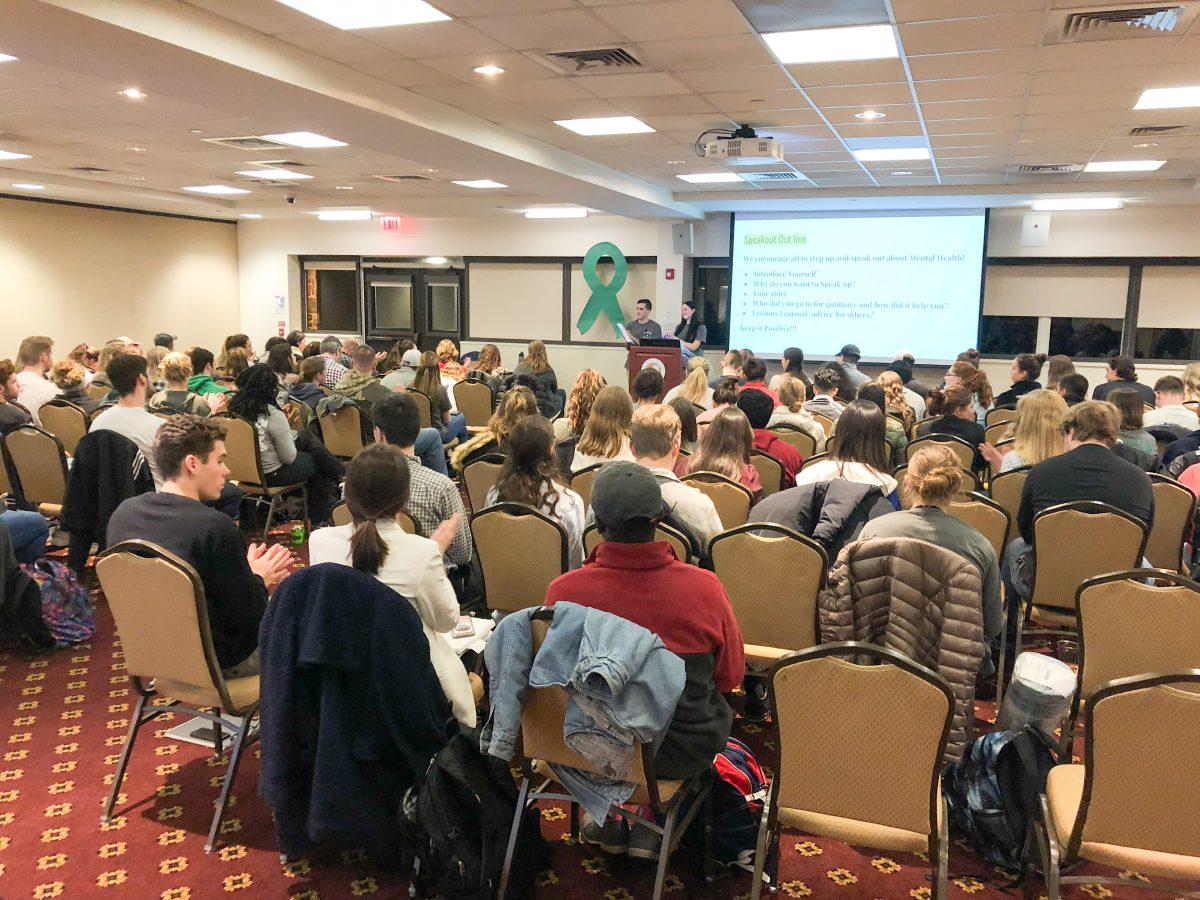Raising awareness for mental health.
The Mental Health Speak Out on Feb. 17 provided a space for nearly 150 students, faculty, and staff to have an open discussion about mental health and the stigma behind it in the South Doyle Banquet Hall.
The Mental Health Speak Out began as a project in the Abnormal Psychology class at St. Joe’s by co-founders Emily Fannick ’18 and Matthew Unger ’18.
“There is a lot of stigma regarding mental health especially mental illness,” Unger said. “It is the speak out which really helps to break down that stigma and show people getting help is okay.”
During this event, individuals were able to discuss mental health and mental illness, and to share their personal experiences in a safe space.
“I attended the Mental Health Speak Out because I was really interested in the awareness for mental health,” Natalia Velazquez ’21 said. “I saw the stories of the student speakers as very relatable, and I loved the advice given and how powerful their words were.”
Ashley Fannick ’19, a member of the Mental Health Speak Out committee, emphasized the values that the events offers not only to speakers, but to the audience as well.
“The most important thing that everybody needs to know is they are not alone,” said Fannick. “If you feel voiceless know there are many resources out there for you to utilize and that many people around you empathize with what you are feeling.”
At the event, speakers discussed personal topics such as obsessive compulsive disorder, general anxiety, college burnout, self-love, body dysphoria, negative schema, mood disorders, season affective disorder, loneliness, substance abuse and self-harm.
Following accounts by the two co-founders the podium opened up to the audience to allow those in attendance a chance to speak.
Greta Shanley ’18 was one of the students who shared their stories at the event.
“Mental health is affected a lot more people on college campus than we know about so it is important to speak up to about mental illness to let others know they are not alone which is why I felt called to speak tonight,” she said.
There were two types of speakers at the Mental Health Speak Out, students and educators. Fannick explained the difference between the two and the various points to be taken away from each.
“A speaker includes a student sharing their own story and keeping it positive as for where they went for help and what they learned,” Fannick said. “An educator is an individual from an organization or campus or professor who gives an educational component of mental health.”
One of the educators who spoke, Natalie Petyk, Psy.D., assistant director and a counselor at the Counseling and Psychological Services Center (CAPS) at St. Joe’s, provided a description of what it means to have mental health issues, the effects of mental health on students, and ways to seek help as a student struggling with mental health issues.
Petyk highlighted a few of the options for mental health treatment education on college campuses including public education about mental health and the need for families, communities and consumers to be involved in advocacy, policy-making and forming self-help groups.
A survey provided by those using CAPS revealed that 67 percent of students surveyed agreed counseling helped them to remain in school, according to Petyk.
Many of the speakers who shared their experience with mental illness touched on one common theme: the St. Joe’s community has been one of the strongest support systems for them because of the network of caring individuals within the campus.
“If you let your voice be heard, you will be positively impacting the lives of many people including your own,” Fannick said.
On each attendee’s chair, a slip of paper was presented informing students who are struggling with mental health issues that the following services are available on campus for students to utilize.
Some of these services include Counseling and Psychological Services (CAPS), Campus Ministry, The Success Center, Student Outreach and Support, Wellness, Alcohol, & Drug Education (WADE) Program, Active Minds, Office of Residence Life, Student Inclusion and Diversity, Saint Joseph’s University Public Safety, Saint Joseph’s University Student Health Center, and the Title IX Coordinator.




















































